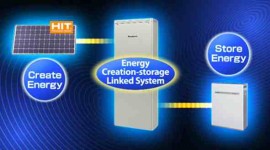Panasonic is set to launch a home storage battery in Australia next month after launching a similar product in its native Japan earlier this year.
So far so normal when it comes to the plethora of residential energy storage systems (ESS) released onto the market each week.
But where it starts to get interesting is that Panasonic plans to roll out the 8kWh lithium-ion-based domestic ESS in Germany, before moving to the UK, France and other European markets.
It’s interesting because it pits Panasonic up against Tesla and its much hyped Powerwall— for which it is expected Panasonic will be supplying the batteries from the $5billion gigafactory being built in Nevada, US. Remember Panasonic also supplies batteries for Tesla’s automotive applications.
But Panasonics search for global dominance doesn’t stop there.
Japanese inverter maker Tabuchi Electric and storage software provider Geli have teamed up to offer a residential solar-plus-storage solution for the US and Canadian market.
And guess what, the system uses a 10kWh Panasonic lithium-ion battery pack, and that has already been installed in more than 1,000 Japanese homes to date.
However, there is a lot of competition in the market. This week alone saw two more pretenders to the home ESS crown.
Firstly back to Tesla, which set the bar in May when it revealed its 7kWh and 10kWh Powerwall device, costing $3,000 and $3,500 respectively. Both can be connected to PVs or to a grid.
Now Californian startup Orison hopes to compete, with two 2kWh devices costing $2,000 (for a tower-style version) and $1,600 (for a panel version).
What makes Orison’s challenge different is the devices can be plugged straight into houses’ mains, eliminating the need for a PV system, which pretty much every other ESS requires.
It can also be scaled up to 8kWh for around $4,900, which means it can go toe-to-toe with Tesla in power, if not cost.
This week fellow Golden State firm SimpliPhi Power, formerly known as Optimized Energy Storage, also made a claim to the light-commercial and residential market with the launch of its long standing energy storage battery technology.
Details are far and few between, but SimpliPhi claims its battery eliminates cobalt chemistry in its lithium-ion battery. The technology uses licensed lithium ferrous phosphate cells with proprietary management boards, circuitry, and cell architecture.
Time will tell if any of this affects Tesla, but what we can deduce is that Panasonic is positioning itself as a key ESS battery supplier if not OEM.












